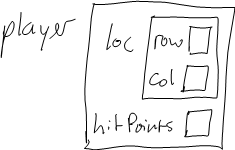Struct initialization
The declaration of a struct variable may include an initializer to set initial values for the fields of the stuct variable.
Example:
struct Point {
double x;
double y;
};
...
struct Point p = { 3.0, 4.5 }; // values are assigned to fields in order
printf("p.x = %lf\n", p.x); // prints the value 3.0
printf("p.y = %lf\n", p.y); // prints the value 4.5Composition
Composition is the technique of building a data type by composing other data types.
The idea is that simpler data types can serve as the building blocks for more complex data types.
For example, in a game, you might have a Location data type which describes locations on the game map:
struct Location {
int row; // a row of the map
int col; // a column of the map
};You could define some useful operations for this data type, i.e. functions which have one or more parameters which are Locations (or pointers to Locations.) For example:
// Change given Location so that its column is
// changed by dx and its row is changed by dy.
void moveLocation(struct Location *loc, int dx, int dy)
{
loc->row += dy;
loc->col += dx;
}Now, let's say we are defining a Player data type to represent the data concerning the player's character in the game. One piece of information that the game will need to keep track of for the player character is where on the map the player character is. So, we can use composition to place an instance of the Location data type inside the Player data type:
struct Player {
struct Location loc; // the player character's location
int hitPoints; // player character's hit points
};We can visualize this composition as follows:
A Player instance has two fields, a Location called loc and an int called hitPoints. Because loc is itself a struct instance, it has fields of its own: an int called row and an int called col.
Because the Player data type builds on the Location data type, the functions (operations) you defined to work with Location instances can be used to help to implement functions which perform operations on Player instances. For example:
void movePlayer(struct Map *map, struct Player *player, int dx, int dy)
{
struct Point nextLoc;
// set nextLoc to the location the player is trying to move to
nextLoc = player->loc;
moveLocation(&nextLoc, dx, dy);
// determine if this is a legal move
if (isLegalMove(map, nextLoc)) {
// legal: player moves
player->loc = nextLoc;
}
}The movePlayer function computes the Location the player is trying to move to, determines whether the new location is a legal location, and, if so, updates the player's Location.

